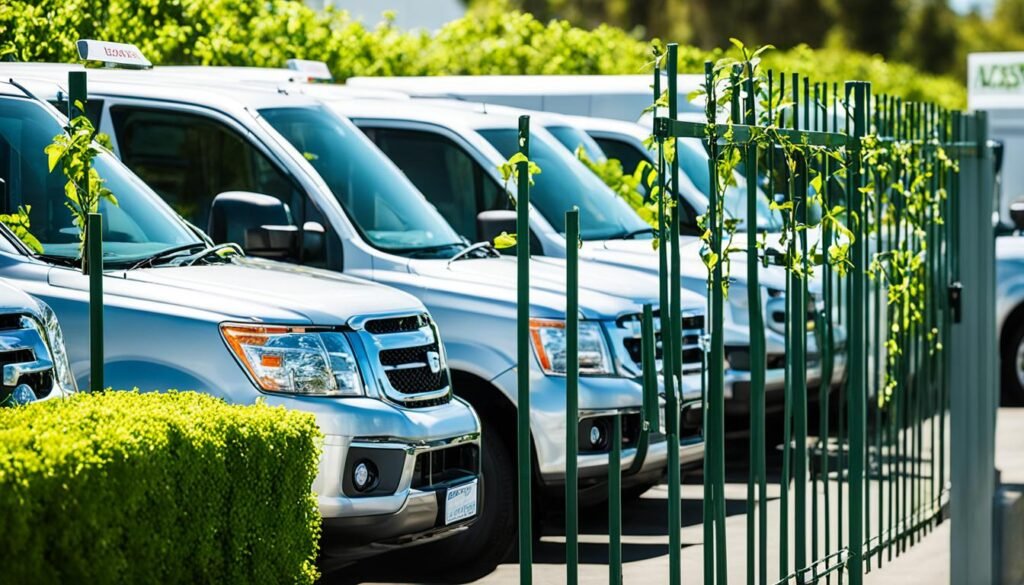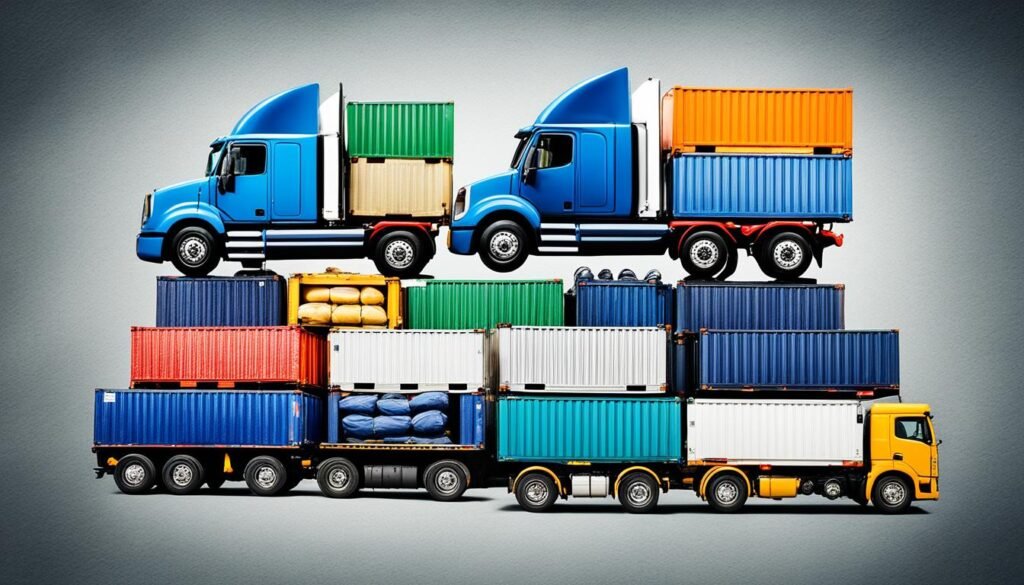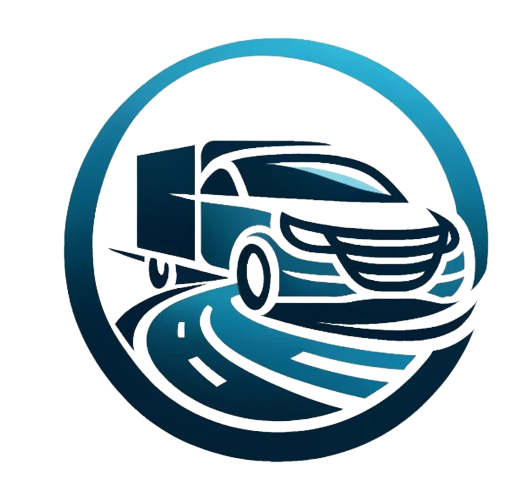Fleet insurance is super helpful for companies with lots of commercial vehicles. It shields them from big repair and medical costs. It also cuts down on paperwork and makes insurance cheaper. This kind of insurance is key for businesses that use many vehicles. It helps protect their assets from accidents, theft, and damages.
To get fleet insurance, companies need to share lots of information. This includes their current insurance details, driver and vehicle info, and past loss records. They also must provide financial data, safety ratings, and any lease agreements. There are many types of insurance for these vehicles, like general liability or cargo insurance. The cost of insuring a fleet or truck can change, based on what kind of coverage is needed and other factors.
Key Takeaways:
- Fleet insurance provides financial protection for companies with commercial vehicle fleets.
- It covers repair costs, medical bills, and reduces administrative work and insurance premiums.
- Insurance providers require various documents and information to underwrite a fleet insurance policy.
- Different types of commercial truck insurance are available, catering to specific coverage needs.
- The cost of truck and fleet insurance varies based on factors such as insurance type and fleet size.
What is Commercial Fleet Insurance?
Commercial fleet insurance is like a shield for company vehicles. It protects them financially from accidents, theft, or damage. This makes it key for companies managing a fleet. The Federal Motor Carrier Safety Administration (FMCSA) also mandates it when getting operational approval.
This coverage lowers cost because it cuts repair costs, medical bills, and administrative work. It includes vehicles driven for business like cars, vans, and trucks. It can also cover leased or employee-used vehicles for work.
For businesses, this insurance is crucial. It keeps their fleet and operations safe from the unexpected. In cases of accidents, theft, or damage, fleet insurance steps in. It helps companies deal with financial risks and keep their fleets running smoothly.
What Information is Needed for Fleet and Commercial Truck Insurance?
When you want fleet and commercial truck insurance, you’ll need to share specific info. This helps the insurance company set the right coverage and prices. They will ask for:
- Current commercial insurance policy declarations page or personal automobile insurance contract: It lets them know what coverage you already have. This helps them make the right new policy for you.
- Driver’s license numbers and driving histories of commercial drivers: They need to check how safe your drivers are. Their driving history helps decide the risk.
- Vehicle identification numbers (VINs) of every commercial vehicle to be insured: Each vehicle’s VIN is like its fingerprint. It’s crucial for covering all your fleet’s vehicles.
- Loss runs from previous insurance providers: These give a sneak peek at your claims history. It helps the insurance company see what risks are involved with your fleet.
- Audited or reviewed financial statements: Your finances show your stability. Insurers use this to decide how much coverage you might need.
- Copies of International Fuel Tax Administration (IFTA) reports: These reports tell about your fuel use and other details. They are important in setting your policy terms.
- Safety ratings from federal compliance reviews: These ratings show how well you follow safety laws. They also influence your insurance costs.
- Copies of lease agreements: The insurance company needs to know your leasing terms. It’s part of making sure your coverage fits your situation.
- Other relevant documents or information: Sometimes, the company may need extra info. This makes sure they understand and cover all your needs.
Sharing all the right details helps make the insurance process smoother. It allows insurers to create the best policy for your fleet.
Fleet Insurance Checklist:
| Required Documents | Additional Information |
|---|---|
| Current insurance policy declarations page or personal automobile insurance contract | |
| Driver’s license numbers and driving histories of commercial drivers | |
| Vehicle identification numbers (VINs) of every commercial vehicle to be insured | |
| Loss runs from previous insurance providers | |
| Audited or reviewed financial statements | |
| Copies of International Fuel Tax Administration (IFTA) reports | |
| Safety ratings from federal compliance reviews | |
| Copies of lease agreements | |
| Other relevant documents or information |
Types of Commercial Truck Insurance
When you own a fleet of commercial trucks, getting the right insurance is vital. There are many types of truck insurance for the needs of trucking and transport companies.
General Liability Insurance
General liability insurance protects against injuries and property damage from business activities not related to truck driving. It avoids potential lawsuits and costs for businesses.
Primary Liability Insurance
Primary liability insurance is the least you need for your trucking business. It covers damages to others in your truck at-fault for accidents. Yet, it doesn’t include your truck or its cargo.
Non-Trucking Liability Insurance
Non-trucking liability insurance, or bobtail insurance, covers your truck’s personal use between work trips. It guards against risks when drivers use their trucks for personal reasons.
Motor Truck Cargo Insurance
Cargo insurance pays for lost or damaged goods when transported. It keeps trucking companies safe from loses due to theft or damage of cargo.
Physical Damage Insurance
Physical damage insurance takes care of your truck when it’s in an accident or encounters other covered issues. It includes collision, comprehensive, and specified damage protection.
Contingent Cargo Insurance
Freight brokers often get contingent cargo insurance. It helps if there are problems with their main cargo insurance. This policy protects freight brokers’ money in complex cargo claims.
Workers’ Compensation Insurance
For fleet owners and those with truck drivers, worker’s comp is a must. It pays for injuries or illnesses workers get on the job. This helps employers and employees alike.
It’s important to know about the several commercial truck insurance types to cover your fleet correctly. They protect against damage, cargo loss, and injuries at work. The right insurance brings peace of mind and financial safety.
How Much Does Truck and Fleet Insurance Cost?
The cost of truck and fleet insurance can change based on many things, like the type you pick and the company. Here’s a look at the typical prices:
Owner-operators with their own authority:
- Monthly insurance costs: $667 to $1,250
Keep in mind, these are averages. Your costs might be different, depending on your situation and the insurer you choose.
Owner-operators leasing to a motor carrier:
- Average monthly costs: $167 to $333
Primary liability coverage:
- Monthly cost: $416 to $1,000
Many other insurances like general liability and cargo have their own price ranges too.
What you’ll pay for truck and fleet insurance is affected by a few things:
- The size and purpose of your fleet
- The classification of the vehicles
- The carrier’s safety ratings
- The driving history of your drivers
Comparing coverage and costs from various insurers is key to finding the right fit for your fleet.
Insurance Premium Comparison Table (Estimated costs per month)
| Insurance Type | Average Cost Range |
|---|---|
| Owner-operators with their own authority | $667 – $1,250 |
| Owner-operators leasing to a motor carrier | $167 – $333 |
| Primary liability coverage | $416 – $1,000 |
| General liability insurance | Varies |
| Bobtail insurance | Varies |
| Cargo insurance | Varies |
| Physical damage insurance | Varies |
The insurance costs for your trucks can vary a lot. This means it’s very important to get quotes from different companies. Make sure the coverage meets your fleet’s needs.

Factors Affecting the Cost of Commercial Truck Insurance
Businesses need to think about many things when getting truck insurance. The cost varies due to several key points. These include:
Fleet Size, Purpose, and Classification: The size, use, and type of trucks matter a lot. A big fleet or those carrying dangerous goods might pay more. This is because the risk of accidents is higher for them.
Carrier’s Safety Ratings: How safe the carrier is affects costs. Companies with high safety marks pay less. This is because they are seen as less risky.
Driving History of the Drivers: The past driving of those behind the wheel is crucial. If they’ve had accidents or tickets, costs go up. This is because it shows they could claim more in the future.
Insurance Requirements: What the FMCSA says you have to have matters. The higher the insurance the FMCSA asks for, the more you might pay.
State’s Minimum Liability Limits: Every state sets its own rules for insurance limits. Some have high minimums meaning more money for insurance.
Vehicle Value and Condition: The value and shape of the trucks also make a difference. If your vehicles are expensive or not well-kept, you might pay more.
Shipping Distance and Routes: How far and where you ship goods can change your costs. If you go through risky places, like high-crime zones, prices can go up.
Type of Carrier Service: The specific type of transport service you use plays a role. For instance, enclosed carriers cost more to insure. They offer more protection but come at a price.
Understanding these factors helps businesses keep their insurance costs in check. Talking with insurance companies is key. They can guide you on managing your truck insurance well.

| Factors | Impact on Insurance Costs |
|---|---|
| Fleet Size, Purpose, and Classification | Higher fleet size or riskier vehicle types can result in higher premiums. |
| Carrier’s Safety Ratings | Carriers with higher safety ratings may receive lower insurance premiums. |
| Driving History of the Drivers | Accidents, violations, and incidents can increase insurance costs. |
| Insurance Requirements | Higher coverage limits mandated by the FMCSA can lead to higher premiums. |
| State’s Minimum Liability Limits | Higher minimum liability limits in some states can result in higher costs. |
| Vehicle Value and Condition | More expensive or poorly maintained vehicles may have higher premiums. |
| Shipping Distance and Routes | Riskier routes or longer distances can increase insurance costs. |
| Type of Carrier Service | Additional features like enclosed carriers may raise insurance premiums. |
How Auto Transport Insurance Works
Auto transport insurance is a must for anyone moving cars. It covers damages while the vehicles are moved. Most car moving services give basic insurance. But, you might need more depending on what your vehicle needs.
Liability insurance is big in auto transport insurance. It safeguards against damages to other cars or items from accidents in transport. It brings peace of mind and security if unexpected accidents occur while moving.
Another type is comprehensive insurance which goes even further than liability. It covers theft, vandalism, and natural disasters. It’s great for those who want to be fully protected from all risks.
Note, your current car insurance might help during transport. Talk to your insurance to know what they cover. You might need extra insurance for extra safety.
Brokering with auto transport helps get the best insurance. They check if the transport companies have valid insurance. This makes the move less stressful.
Benefits of Auto Transport Insurance:
- Financial protection against damages during vehicle transport
- Basic liability coverage included with the cost of shipping
- Additional coverage options available for comprehensive protection
- Minimization of potential financial losses
- Peace of mind during the transportation process
- Assistance from auto transport brokers in finding reputable transport companies
Knowing about auto transport insurance is key. Working with brokers can help get the right coverage. This ensures your vehicles are safe and covered while shipping.
| Insurance Type | Coverage |
|---|---|
| Liability Insurance | Damages to other vehicles or property due to accidents involving the transport equipment |
| Comprehensive Insurance | Extended coverage for theft, vandalism, and damage caused by natural disasters |
| Existing Car Insurance | May offer some coverage during vehicle transport, but additional protection should be verified |
Auto transport insurance brings comfort. It assures your vehicles against damage during transport. Whether simple coverage or extended, the right choice makes moving secure and easy.
Types of Vehicle Transport Insurance
Vehicle transport insurance is key for keeping your car safe from damages or losses. There are several types of this insurance. They make sure your car is covered while being transported.
Carrier Insurance
Carrier insurance is the most common. It keeps your car safe from damages when in the carrier’s hands. This coverage gives peace of mind. It ensures you’re financially safe if there’s an accident or damage during the trip.
Primary Insurance
Primary insurance is extra coverage from either the transport company or your auto insurance. It covers more risks, like theft or natural disasters. This broader protection ensures your car is safe from all kinds of harm.
Broker Insurance
Broker insurance adds an extra layer of protection. Vehicle transport brokers offer it. It can stand alone or come with carrier insurance. Make sure to check the details of the policy before choosing. This ensures you pick the coverage that suits your needs best.
It’s crucial to know about the different insurance types for vehicle transport. This knowledge helps you make the best choice for protecting your car. Carrier, primary, or broker insurance all offer protection. Having the right coverage gives you peace of mind during transport.
What Are the Key Differences Between Fleet Vehicle Transport Insurance and Dealer Transport Insurance?
Fleet vehicle transport insurance is designed for companies with multiple vehicles, while understanding dealer transport insurance is tailored for individuals or businesses moving cars from manufacturers to dealerships. The key differences lie in coverage specifics, including liability limits, cargo protection, and overall cost. Understanding the distinction is crucial for selecting the right policy.
Factors Affecting Auto Transport Insurance Costs
Auto transport insurance costs can be affected by many things. The value and state of the vehicle matter a lot. If a car is expensive or not in good shape, the insurance cost might go up. Make sure to tell the insurance company all they need to know about your vehicle. This will help you get the right insurance price.
The distance and route of the shipment are also key. If the route goes through places with a lot of crime or natural disasters, insurance could be more expensive. This is because the risk is higher. Insurance companies look at these risks to figure out the price you’ll pay.
The kind of carrier service you choose can change how much you pay for insurance. Pick either an open or enclosed carrier. Enclosed carriers give more protection but might cost more. Think about the pros and cons of each kind of service. Then decide what’s best for you and your insurance.
To get the right price for vehicle insurance, you should tell the insurance company a lot about your car. Also, talk about the shipping routes and their risks. This will make sure you get an accurate insurance price. Knowing this will help you have the right coverage for your car during transport.
FAQ
What is fleet vehicle transport insurance?
Fleet vehicle transport insurance helps companies protect their vehicles during travel. It covers any damages or losses during transportation.
What is commercial truck insurance?
Commercial truck insurance safeguards companies with big trucks. It covers damages and losses while these trucks work.
What information is needed for fleet and commercial truck insurance?
You’ll need different details to get this insurance. For example, your current policy and other documents, drivers’ licenses, and more.
What are the types of commercial truck insurance?
Commercial truck insurance has several types. They include general liability and cargo insurance, among others.
How much does truck and fleet insurance cost?
Truck insurance costs vary. They depend on the carrier, the fleet size, and other factors. For self-governing truckers, they usually pay between $667 and $1,250 monthly.
What factors affect the cost of commercial truck insurance?
Many things affect the price of truck insurance. This includes fleet size, safety ratings, and the drivers’ history. The FMCSA’s rules and your state’s laws also matter.
How does auto transport insurance work?
Auto transport insurance guards against car damage during shipping. While basic coverage is required, companies might offer more options.
What are the types of vehicle transport insurance?
You’ll find carrier insurance, primary insurance, and broker insurance. Carrier insurance specifically protects vehicles in their care.
What factors affect auto transport insurance costs?
Insurance prices change with the car’s value and the route. Features like enclosed carriers can also impact the cost.
,250 monthly.
What factors affect the cost of commercial truck insurance?
Many things affect the price of truck insurance. This includes fleet size, safety ratings, and the drivers’ history. The FMCSA’s rules and your state’s laws also matter.
How does auto transport insurance work?
Auto transport insurance guards against car damage during shipping. While basic coverage is required, companies might offer more options.
What are the types of vehicle transport insurance?
You’ll find carrier insurance, primary insurance, and broker insurance. Carrier insurance specifically protects vehicles in their care.
What factors affect auto transport insurance costs?
Insurance prices change with the car’s value and the route. Features like enclosed carriers can also impact the cost.

